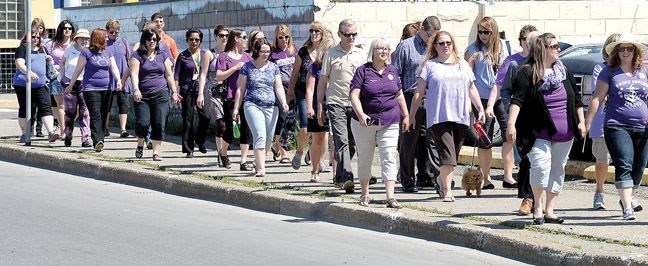Clad in shades of purple to acknowledge World Elder Abuse Awareness Day, about 50 people held a noon-hour walk through downtown Prince George on Monday to raise awareness about the issue.
About 10 per cent of older people will suffer some form of abuse or neglect in their retirement years, said Wendy Brophy, co-chair of the Prince George Community Response Network.
"It is quite prevalent and often goes unnoticed or unrecognized," Brophy said.
The forms of elder abuse are many, but Brophy said the most common is financial.
Signs of that type of trouble include sudden changes in wills and unusual bank account withdrawals.
Other forms include manipulating prescriptions, censoring mail, and simple mistreatment that causes physical, mental or emotional harm.
Warning signs include injuries, such as bruises, sprains, scratches and broken bones, that do not fit the explanation; changes in behaviour, such as depression withdrawal or fear; changes in regular social activity such as missing church or other social events; changes in living arrangements such as previously uninvolved relatives or new friends moving in.
Additional signs of neglect can include no food in the home, being left alone for long periods of time, not having glasses or hearing aids that are needed and not having proper clothing.
If an older person tells you they are being mistreated, believe them, anti-elder abuse advocates advise.
Those who have come across any of those signs are urged to contact the Prince George Community Response Network at 250-649-3321 or email Brophy at [email protected].
"Our role at the community response network is to bring people together and network so that when someone does come forward with an issue, we know who to connect them with to get that help they need in the community," Brophy said.
Additional information can also be found at the B.C. Association of Community Response Networks website: www.bccrns.ca.

.png;w=120;h=113;mode=crop)

